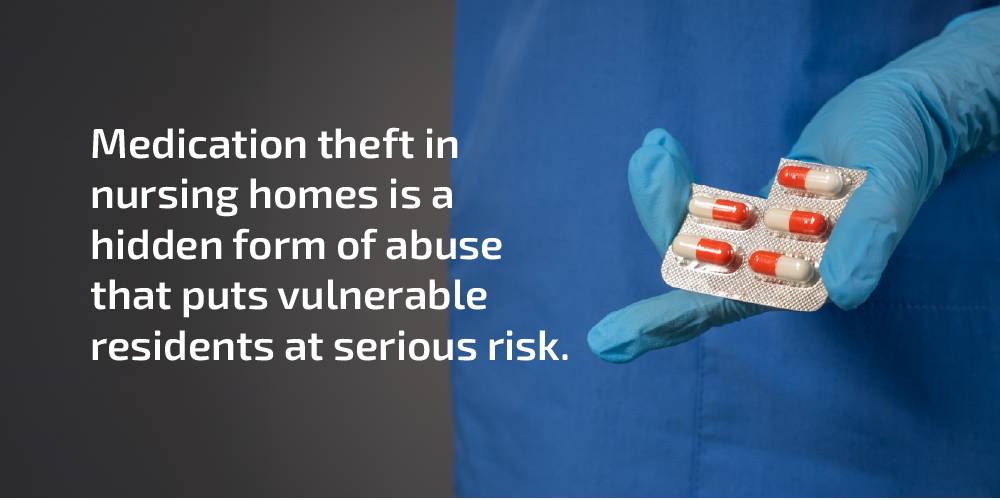I Think My Parents' Nurse is Stealing Their Medicine
 Your parent mentions they are in more pain than usual. Their prescription bottle seems to empty faster than it should. They complain about symptoms that their medication is supposed to control. You might start by doubting your initial suspicions. You want to believe there is a reasonable explanation, but a nagging feeling tells you something is wrong.
Your parent mentions they are in more pain than usual. Their prescription bottle seems to empty faster than it should. They complain about symptoms that their medication is supposed to control. You might start by doubting your initial suspicions. You want to believe there is a reasonable explanation, but a nagging feeling tells you something is wrong.
Medication theft in nursing homes is more common than most families realize. When staff members steal prescription drugs from vulnerable residents, it is a form of abuse, and the consequences can be devastating. Your loved one might suffer serious injuries, experience uncontrolled symptoms, or even face life-threatening complications.
If you are concerned that your parent’s medication is being stolen or diverted in their nursing home and your parent is suffering or becoming seriously ill as a result, take your concerns seriously. Talk to a St. Clair County nursing home injury lawyer.
Please note that we do not handle cases involving theft without injury. Although these cases are serious and deserve justice, our firm focuses on cases involving serious injury and death.
Do Nursing Home Staff Steal Medication?
Prescription drug abuse has reached epidemic levels across the country, and nursing homes are not immune to this crisis. Staff members with addiction problems see easy access to powerful medications every day. Pain medications like oxycodone, morphine, and fentanyl are particularly attractive targets. Anti-anxiety drugs such as Xanax and Ativan also get stolen frequently.
Some staff members steal medications to sell them. Prescription painkillers earn high prices on the street, and nursing home employees know exactly which drugs have the most value. Others take medications for their own use, either to feed an addiction or to self-medicate for pain or mental health issues.
What Are the Signs That Someone Is Stealing Your Parent's Medication?
Recognizing medication theft requires careful attention to both your parent's condition and the circumstances around their care. Physical and behavioral changes in your loved one often provide the first clues that something is wrong:
-
Your parent might complain that their pain is not being controlled, even though they should be receiving regular doses of pain medication.
-
Symptoms that were previously well-managed suddenly return.
-
Your parent might experience withdrawal symptoms, like sweating, shaking, anxiety, nausea, or confusion.
- Your parent may pass away because of an unmanaged, acute condition.
Check prescription bottles during your visits. If refills are needed much sooner than expected, that raises a red flag. Compare the number of pills in the bottle to what should be there based on the dosage schedule. Missing pills are an obvious warning sign. Some staff members replace stolen pills with other medications to avoid detection, so pills that look different from what your parent usually takes deserve investigation.
How Does Medication Theft Harm Nursing Home Residents?
The harm from stolen medication extends far beyond the obvious. When your parent does not receive prescribed drugs, their health deteriorates in ways that can cause lasting damage or even wrongful death.
Uncontrolled pain affects every aspect of life. Your parent might become unable to participate in physical therapy or daily activities. Chronic pain can lead to depression, social withdrawal, and a rapid decline in overall health. For residents recovering from surgery or managing conditions like cancer, missing pain medication causes intense suffering that can border on torture.
Missing doses of critical medications can be life-threatening. Heart medications, blood pressure drugs, diabetes treatments, and anti-seizure medications all require consistent dosing. Gaps in treatment can trigger strokes, heart attacks, diabetic emergencies, or seizures. These events can cause permanent disability or death.
What Should You Do If You Think the Nursing Home is Stealing Your Parent’s Medicine?
You should act quickly when you believe someone is stealing your parent's medication. The steps you take now can protect your loved one and create a record of what happened.
Document Suspected Medication Theft
Start by documenting everything you have observed. Write down dates, times, and specific incidents that raised your concerns. Note which staff members were on duty when problems occurred. Take photos of prescription bottles showing the pill count and label information.
Talk to Your Parent
Talk to your parent about what they have experienced. Ask specific questions about their pain levels, symptoms, and when they remember receiving medications. If they are mentally capable, ask if they have noticed anything suspicious about how their medications are being handled. Record this conversation in your notes.
Meet With the Nursing Home Administrator
Request a meeting with the nursing home administrator immediately. Bring your documentation and clearly state your concerns. Ask them to investigate and provide you with a full accounting of your parent's medication records. Request that they review security footage if cameras are present in medication storage areas or hallways.
Contact Your Parent's Doctor
Contact your parent's doctor directly. Explain the situation and ask them to evaluate your parent for signs of under-medication or withdrawal. The doctor can order tests to check medication levels in your parent's blood if appropriate. Medical documentation of inadequate medication levels becomes important evidence if legal action is necessary.
Report the Medication Theft
Report the suspected theft to the Illinois Department of Public Health, which oversees nursing home facilities. Illinois’ Nursing Home Care Act protects residents from medication theft and allows you to take legal action. You can also contact local law enforcement, as medication theft is a crime. Do not let the facility talk you out of making these reports. They might promise to handle it internally, but outside oversight is essential to ensure a real investigation happens.

Medication Theft Can Be Part of a Larger Pattern of Abuse
Medication theft rarely exists in isolation. Facilities where staff members feel comfortable stealing from residents often have deeper problems with abuse and neglect. Once you discover medication theft, look for other warning signs that your parent is not receiving proper care.
Physical abuse might accompany medication theft, particularly if staff members are impaired by drugs they have stolen. Unexplained bruises, cuts, or other injuries warrant immediate investigation. Neglect becomes more common in facilities with lax oversight. Check whether your parent is clean, well-groomed, and properly dressed. Look for signs of dehydration, malnutrition, or untreated medical conditions.
Financial exploitation often goes hand in hand with medication theft. Staff members who cross the line to steal drugs might also be abusing your parent in other ways.
Call a Winnebago County, IL Nursing Home Injury Attorney Today
If you suspect that a nurse or other staff member is stealing your parent's medication, you need legal guidance. Medication theft causes real harm to vulnerable people. Your parent deserves better care, and you deserve answers about what happened and why.
Contact Schwartz Injury Law at 312-535-4625 for a free consultation about your situation. When you call, you will speak with a real St. Clair County, IL nursing home abuse lawyer, not an intake service. Our firm handles serious injury, abuse, and neglect cases involving nursing home residents who suffer serious injuries and wrongful death.

 312-535-4625
312-535-4625





